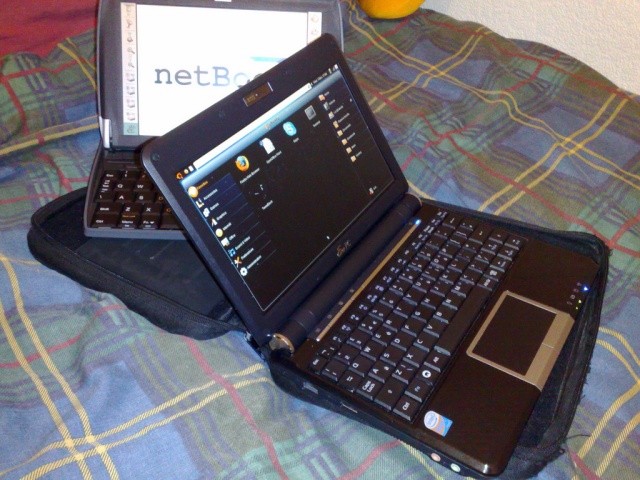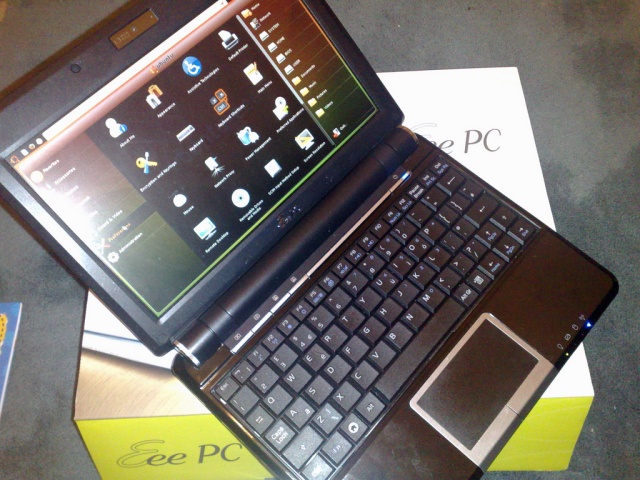"We are looking very actively also at this opportunity," Nokia's Olli-Pekka Kallasvuo said to a Finnish Broadcaster. Well he would, wouldn't he? The rise of the netbooks in the last 12 months has been nothing short of a sea-change in attitudes in the laptop market. The old order of high profit margins for companies like Apple, Dell and HP has been upturned. Some are adapting (witness the Dell Inspiron Mini 10 just launched in the UK), while others are leaving a conspicuous gap in their product line up (Apple).
So when you as a CEO, are asked if you're looking at a brand new consumer electronics sector, then the answer is yes, we are looking at it; then don't commit yourself to actually doing anything about it, because you're focused on moving the company from hardware-led to being software and services-led. But then the Internet picks it up and becomes “Nokia looking to release a netbook”.
Now the romantic in me (and Steve) will be thinking that as the robust Symbian OS grew out of the OS that powered the award winning Psion machines (including their, cough, "netbook", in 1999, shown behind, in the photo below) then the machine would be the bestest cutest lil machine in the world. If they ask the Symbian Foundation nicely, then the EIKON interface can be dusted back down for public use and all will be right in the world.
They'll just need the applications to run on the device and they'll be set.

And when I sat down to write this piece, I have to say my thoughts were that Nokia shouldn't be looking at the netbook space. They've got enough on their plates at the moment, the new devices need attention and promotion, it will confuse the marketing message, there's very little profit in commodity devices...
At which I stopped that train of thought.
Nokia are looking to turn themselves into a company where their lead products are software based, and focussed on cloud computing. The need for a desktop computer is reduced – what's needed is a device to connect to the data, possibly store a local copy for syncing, display and manipulate it, and send it back to the cloud. I don't think that people are going to stomach a total cloud solution (I know I wouldn't be one of them) because accidents and problems do happen – witness this week's outage of GMail in the UK and Europe (America was sleeping, so you might not have read about it on Techmeme).
So a machine with a bit of storage, nice screen and keyboard, modern operating system... I'm sure you could argue that this is the N97 in terms of function but the form is not the 'hot form' at the moment. That belongs to laptop style machines with 9-10 inch screens, 80-90% sized keyboards, with a running battery life of around 5-6 hours while connected via Wifi or 3G.
To be honest, with Nokia's factories and manufacturing base, they should be able to churn out a netbook spec and sized machine to supply almost at cost basis (alternatively there are plenty of factories in China that are more than happy to produce some white label versions for the Finns). The key is not the hardware - as long as it hits the expected specs in the market, then Nokia have a good base design.

[Ewan luurrvvvveess his Eee PC.... Ed]
It is what goes in it that's the big question. The obvious leap is a version of Symbian OS, and I think that might depend on how much success the Symbian Foundation has in developing an OS that works on various form factors. Given that (a) UIQ tried this and didn't really pull it off and (b) they've suggested they'll be using S60 as a basis, the 'vanilla' Symbian OS isn't going to cut it
If Nokia are going down this route, I'd suggest doing what the majority of other manufacturers are doing and use Linux, probably with a custom theme on top of Ubuntu. While Maemo is kicking around, it's again for a small pocketable device with limited functionality (go on, argue with me). A Nokia netbook is going to need a decent 'proper' operating system. The magic sauce from Nokia would be two-fold. First they would be able to provide decent connectivity apps to their S40 and S60 devices. Secondly, they need to program an Ovi Suite of apps for Ubuntu that allows access and local storage to the address books, calendars, music stores, maps, share, and everything else under Ovi. Bingo, a full suite of PIM, Media and Entertainment apps.
(For extra bonus points they could release these for any Ubuntu users – that would set the cat amongst the pigeons).
To pull this off could be done with little distraction. All of this would need a small team of programmers, split out from the regular Nokia effort and packaged into a small office somewhere – a Tiger Team/Skunkworks operation, in essence. The original Skunkworks, by Lockheed, had Clarence Johnson running the regular Lockheed operation in the morning, before going cloak and dagger in the afternoon at the Skunkworks, building the U2 Spy plane, the SR-71 and the American Stealth Fighter.
Nokia has the software engineers to do this (and the cash pile to hire a few as well). It might not be Symbian, but it would boost the ecosystem of Ovi, which would be a huge boost to the company overall and to its smartphone system. Now, does anyone know anyone in Nokia that's got experience of PDA's, pocket computers and running a small team of programmers, that might be looking for a new project?
-- Ewan Spence, Feb 2009.
Rafe's comment
It's hardly a surprise that Nokia is taking a look at the laptop market, but this doesn't really tell us very much. Nokia will always being looking at adjacent business opportunities. I'm sure OPK had a reasonably idea that his comments to YLE might cause a reaction, though, in typical web style, it is being blown out of all proportion. As Ewan rightly points out Nokia has the necessary design and manufacturing competence to follow this through if it wishes.
However I would be wary of coming to the conclusion that Nokia is suddenly going to produce a Nokia branded laptop or net book as we visualise them today. Instead I would consider the way mobile phone and PC's in general are converging towards each other. The netbook and MID type devices are pushing downwards from the PC side while the smartphone, especially in the shape of devices like the N97, are pushing upwards from the mobile phone side. Nokia has been calling its Nseries devices 'multimedia computers' for some time now and described the N97 a 'laptop replacement'; clearly there is some marketing speak in such designations, but nor are they unreasonable categorisations.
This discussion also plays into the future of the netbook. Or you can look at it more broadly as a discussion about what will be the dominant personal computing device. I think you can argue that the netbook/laptop, as we visualise it now, has a limited shelf life. It's popular today because of the cost and practicality factors, but it is hardly an elegant solution being based on 'old' technologies and compromises. Might it not be replaced by mobile phones which have the ability to use external screens and other peripherals? Think about how many screens you have around you - in the home, in the office, on the plane. Certainly multi-core processors with SMP enabled OS's and flash memory mean that processing and storage will not be a significant limiting factor. What about new technologies such as foldable screens or conversational UI? Set this in the context of truly pocketable devices that you can take with you anywhere versus relatively bulky appliances.
I think the reality will be somewhere in between (and will vary greatly by market), but it easy to see why Nokia would be looking at this space; it is the future of what it is doing now. The question, with regards to laptops and netbooks, is not whether, but when Nokia will be in this market and what it will look like in a few years time.
The OS question will exercise some comments, but in the immediate future I would look at Maemo evolving onwards from its Internet tablet origins rather than the Symbian Foundation OS. Of course other Linux based options or Windows might also make sense if Nokia were to produce a netbook in the mold of the eePC tomorrow. Further into the future the picture is more complex - each OS option would have its own merits. The biggest constraint will be energy consumption and that could end up being the dominant OS architectural consideration in the years to come. Symbian OS is well placed here compared to some of its rivals. It may be a moot point anyway, given that the majority of the value will be in the service layer. Nokia's cross platform Qt based software and service layer (Ovi) will be at least as important, probably more so, than the OS on which it runs.
